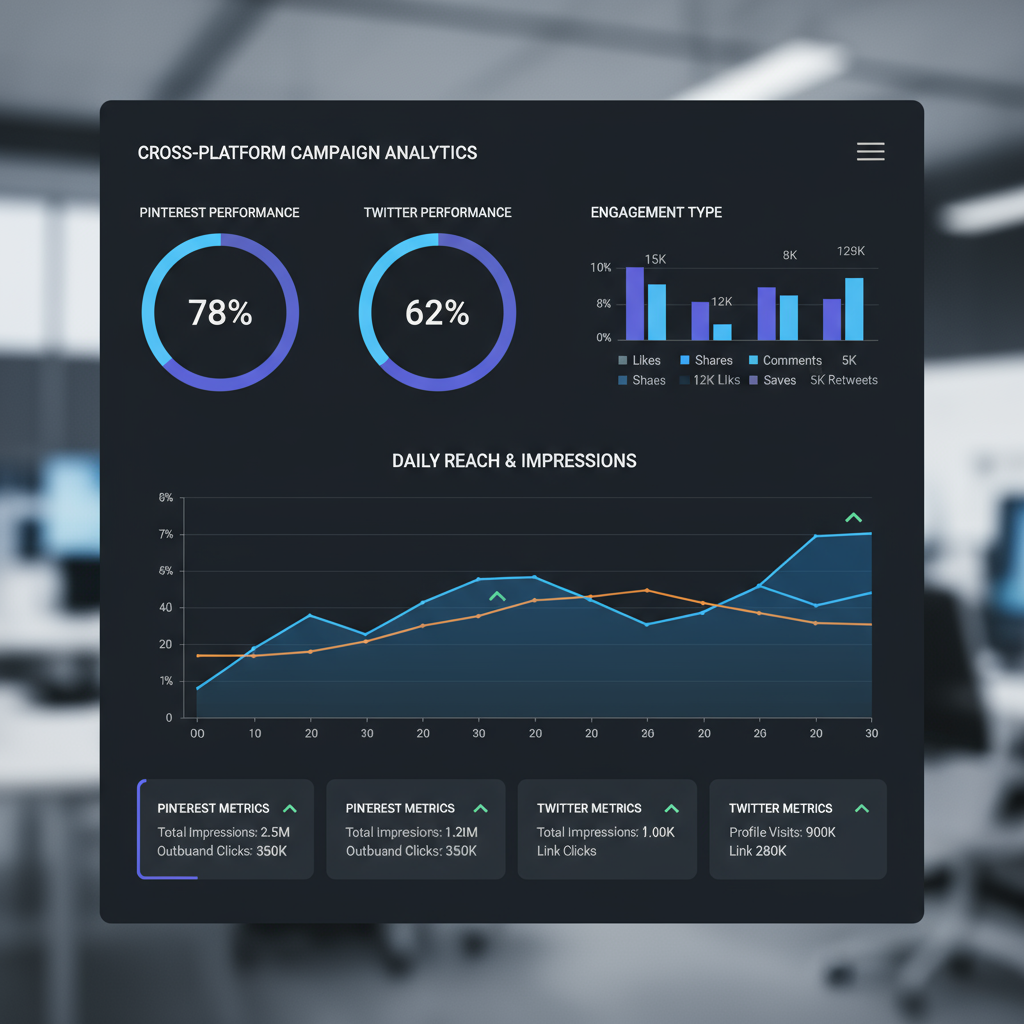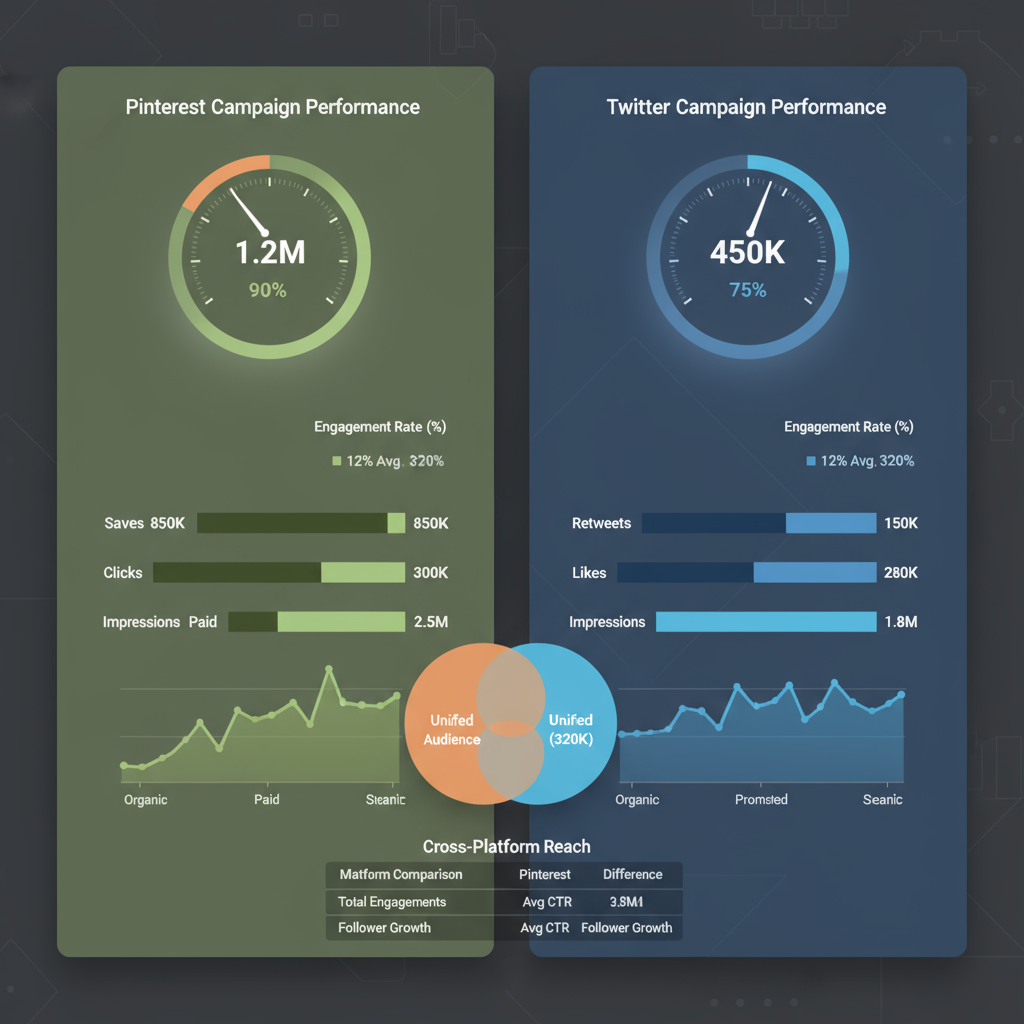Pinterest and Twitter Marketing Strategies for Cross-Promoti
Learn to combine Pinterest’s evergreen visuals with Twitter’s real-time engagement to boost brand awareness, drive traffic, and grow followers.

Pinterest Twitter Cross-Promotion: How to Maximize Each Platform’s Unique Strengths
When done strategically, combining Pinterest’s long-lasting visual discovery with Twitter’s real-time conversation can supercharge brand awareness and engagement. This guide explores how to build an effective Pinterest Twitter cross-promotion plan, from understanding each platform's strengths to optimizing posting schedules and measuring results.
---
Understanding the Unique Strengths of Pinterest and Twitter
Pinterest and Twitter are widely recognized digital marketing platforms, but their purposes, user behavior patterns, and content strengths differ greatly. Leveraging each platform's unique features is the cornerstone of a successful Pinterest Twitter cross-promotion strategy.
Pinterest: Visual Discovery Engine
Pinterest operates as a visual discovery and inspiration hub. Users typically search for ideas, plans, and aesthetic content. Pins are evergreen — a single well-designed pin can drive traffic for months or even years.
Key advantages:
- Long-lived content lifespan
- Strong search-driven traffic
- Ability to organize themes via boards
- High intent audience (planners, shoppers, DIY enthusiasts)
Twitter: Real-Time Conversation Channel
Twitter thrives on breaking news, trends, and lively conversation. It’s a fast-moving network for brands to participate in topical discussions, amplify messages, and engage directly with audiences.
Key advantages:
- Immediate visibility for timely topics
- Viral potential via retweets and threads
- Rich engagement features: polls, replies, quote tweets
- Influencer and thought-leader accessibility

---
Defining Clear Campaign Goals for Cross-Platform Promotion
Before diving into tactics, clarify why you want to use Pinterest and Twitter together. Goals provide focus and measurable benchmarks.
Example campaign goals:
- Drive referral traffic to a product page from both platforms
- Increase brand visibility within a niche
- Grow followers on each platform through shared activities
- Boost engagement for seasonal promotions (e.g., holiday sales)
Ensure goals are SMART: Specific, Measurable, Achievable, Relevant, Time-bound.
---
Creating Platform-Specific Content that Complements Each Other
While cross-posting can save time, it’s more effective to tailor content for each platform while keeping them aligned.
Pins on Pinterest
- Use high-resolution vertical images (2:3 aspect ratio)
- Include keyword-rich descriptions and call-to-action links
- Optimize for search queries relevant to your brand
Tweets on Twitter
- Feature concise, attention-grabbing copy
- Use 1–2 relevant hashtags (including cross-promotional ones)
- Integrate rich media (images, GIFs, short videos)
Pro Tip: Pin an infographic and post a related Twitter thread explaining the data in detail. Link each piece to the other for cross-traffic.

---
Consistent Branding, Tone, and Hashtags
Audiences should recognize your brand instantly, regardless of which platform they encounter first.
Branding Elements to Synchronize:
- Logo placement
- Color palette and font usage
- Writing style (casual, professional, witty)
- Branded hashtags
By keeping your Pinterest Twitter campaign tone consistent, you build trust and recognition.
---
Planning Synchronized Posting Schedules
The timing of posts impacts reach and engagement. Aligning schedules ensures the audience sees connected content in a close timeframe and maximizes cross-platform visibility.
Tips for Scheduling:
- Use social media management tools to plan ahead (e.g., Buffer, Hootsuite)
- Consider peak times for each platform (Pinterest’s evenings/weekends vs. Twitter’s weekday afternoons)
- Space content to allow discovery without overwhelming followers
| Platform | Peak Posting Times (Typical) | Content Lifespan |
|---|---|---|
| Evenings & Weekends | Months to Years | |
| Lunchtime & Late Afternoon (Weekdays) | Minutes to Hours |
---
Leveraging Pinterest Boards to Showcase Twitter Content Themes
Boards serve as curated collections that can narrate a story or promote specific campaign themes. You can create boards that reflect Twitter content strands.
Example:
- Create a “Weekly Tips” board on Pinterest and pin visual summaries of advice tweeted that week.
- Maintain a “Live Events” board showcasing highlights from Twitter live coverage with branded images.
This transforms transient tweets into long-term visual assets.
---
Embedding Tweets into Blog Posts or Landing Pages Linked from Pinterest
One effective tactic is to bridge platforms via your owned media (blog or website).
How-to:
- Draft a blog post elaborating on a topic discussed on Twitter.
- Embed relevant tweets directly within that article (using Twitter’s embed code).
- Pin attractive visuals from the blog post onto Pinterest that link back to the post.

This creates a loop: Pinterest drives traffic to your blog, where embedded tweets reinforce engagement and prompt users to follow you on Twitter.
---
Running Cross-Promotional Contests or Hashtag Challenges
Contests energize audiences and encourage cross-platform action.
Contest Idea Workflow:
- Launch a branded hashtag challenge on Twitter (e.g., #MyDIYStory).
- Ask participants to share visual proof of entries on Pinterest (pinning before/after images).
- Require tagging your account and using the same hashtag on both platforms.
- Feature winning entries on a special Pinterest board and in a Twitter Moment.
Benefits:
- Amplifies content creation by your audience
- Fosters user-generated content
- Expands reach through participant shares
---
Monitoring Cross-Platform Analytics
To understand the impact of your cross-promotion, track analytics regularly.
Pinterest Metrics:
- Impressions
- Click-through rate (CTR)
- Saves (pins shared to other boards)
Twitter Metrics:
- Retweets, likes, replies
- Link clicks
- Follower growth
Use each platform’s analytics dashboard, or integrate results via tools like Google Analytics for unified reporting.
---
Adjusting Strategies Based on Performance and Seasonal Trends
Continuous improvement is vital. Study analytics to identify:
- Best-performing content formats
- Ideal posting times
- High-engagement hashtags
Adapt campaigns during seasonal peaks:
- For holidays, create themed boards and tweets
- During major events, join relevant conversations and pin related visuals
---
Summary and Next Steps
An effective Pinterest Twitter cross-promotion strategy leverages each platform’s distinct advantages: Pinterest’s evergreen visual appeal and Twitter’s fast-paced engagement. By setting clear goals, tailoring platform-specific content, synchronizing posts, and tracking results, you can drive more traffic, build stronger brand presence, and create a seamless experience for your audience.
Ready to boost your marketing results? Start mapping out your own Pinterest Twitter content calendar today and watch your engagement grow across both platforms.



